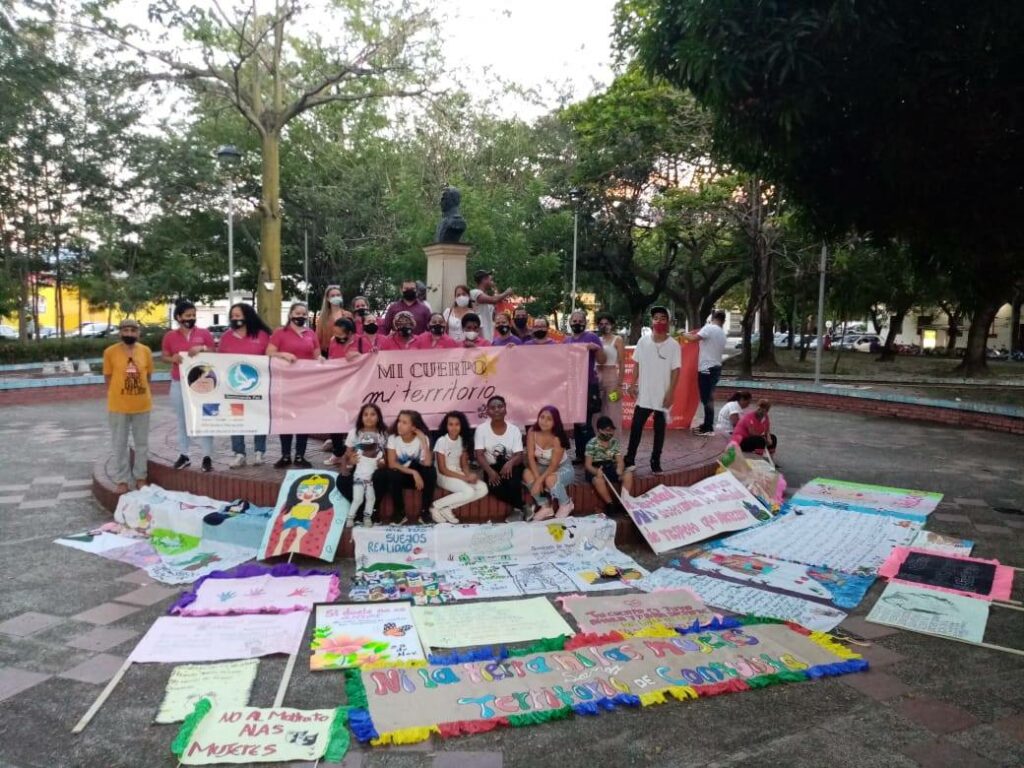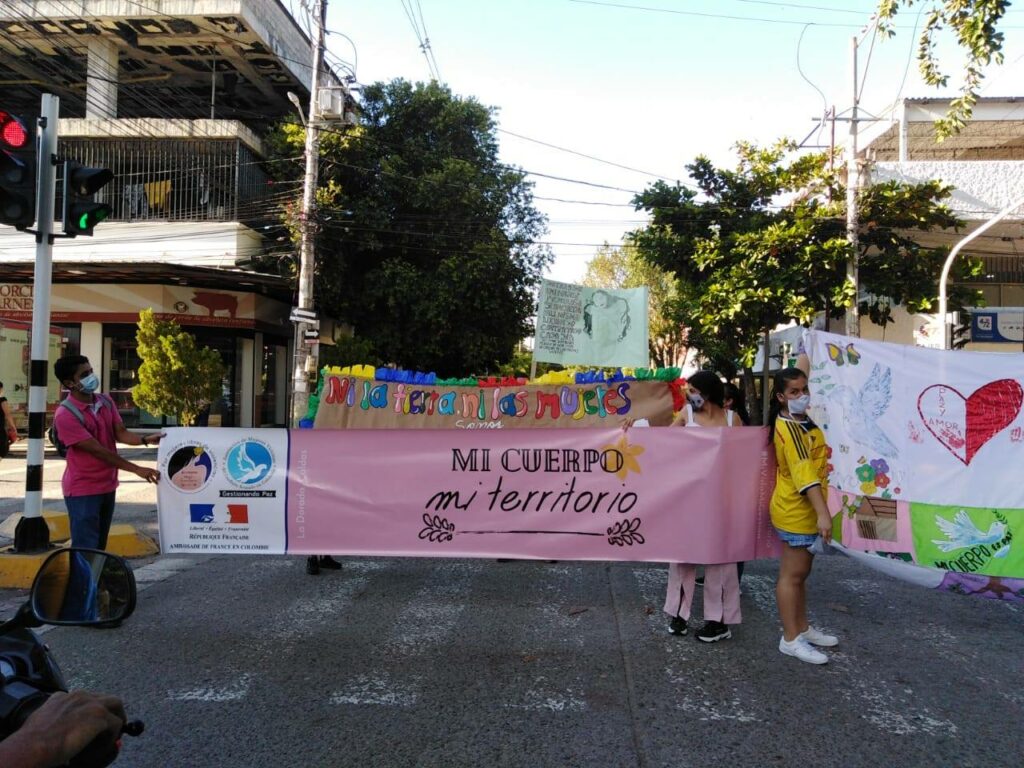Survivors of sexual violence raise their voices and work together for justice with Mujeres Gestionando Paz.

It’s 2.30 pm on a January afternoon in La Dorada, Las Caldas. The air is hot in this central Colombian town which is home to many displaced people. About thirty women, some carrying children in their arms, meet on the second floor of the town’s main shopping mall. All of them are part of the grassroots organisation Mujeres Gestionando Paz and are here to participate in its 2020 general assembly. “So girls, what were the advances of 2019?” asks Ludirlena Pérez, the leader of the association.
Mujeres Gestionando Paz is an NGO that brings together women who were victims of sexual violence during the armed conflict. The women have come together to raise their voices against the way the violence they suffered has been made invisible and to fight against the many stigmas surrounding sexual violence. In doing so, they hope to become agents of social change within their communities.
Ludirlena, herself a victim of sexual violence, explains that the organisation’s mission runs even deeper. It’s about finding peace through forgiveness and reconciliation. “What is forgiveness?” she asks. “It is for me to be able to face the deepest wounds that I kept inside for many years, and refuse to continue to give my life to the perpetrator any more as I start to fully live it for myself.
“What is reconciliation?” she continues. “It is to understand that something is bad in this society, but also to say that we are going to be part of the needed change.”
Related: Behind closed doors: Domestic violence against children in quarantine
Sexual violence has long been – and still is – a taboo topic in Colombia. During the armed conflict, it was perpetrated by all the armed groups, from guerrillas to the army and paramilitaries. The Unidad de Víctimas registered 27,000 cases of sexual violence. Nevertheless, grassroots organisations working with women throughout the country estimate that this figure could reach two million.
Researcher Anne-Kathrin Kreft, whose work focused on the way women mobilise themselves politically in response to sexual violence, says that this type of violence is the ultimate manifestation of patriarchal culture, targeting women as women.
Anchored in social and cultural discrimination towards women, during the conflict this violence was used as a way to sanction women who transgressed gender norms, terrorise and silence communities while re-affirming the domination of women by men.
For a long time, sexual violence has been invisible and so taboo that victims did not feel able to seek help or speak about what had happened to them. Indeed, it was not even on people’s radar. After a massacre or confrontation, Medicina Legal only registered the number of dead. By not registering sexual violence, it effectively silenced the suffering of these women.
That was until women began to raise their voices and share their stories. Together they demanded justice and challenged the social representations of women – and Mujeres Gestionando Paz was created.
A lifeline after sexual violence
Mujeres Gestionando Paz was formed in 2009, when three women who had survived several acts of sexual violence during the conflict came together. Two of them, Ludirlena and Dolly, tell me that after being raped and enduring the violence surrounding it (torture and humiliations often accompany the act), they had fallen into depression. They had both retreated into silent worlds and tried to kill themselves.
Their lifeline came in the form of another woman who was able to speak out about what had happened to her. “If she is able to do it, why couldn’t I?” they said. This thin fragment of hope set them free from the social prejudices which made them feel responsible for what had happened. They became aware that their persecutors were the only culprits and decided to face and challenge society.
They started to build connections with women in the town who had also been victims of sexual violence. Together they created a caring space, where those women would find the strength to speak out and regain their dignity as human beings.

It’s hardly surprising there’s a feeling of tremendous impunity around sexual violence since 98% of the cases reported to the ordinary judicial system remain unpunished. The group have been documenting cases and passing them to the Special Jurisdiction for Peace, which, as a mechanism of transitional justice, represents a great hope of justice for victims of sexual violence. en
“But, how do you manage to motivate women to speak when there are still threats from armed gangs and such strong social stigmas?” I ask, intrigued. “How do I come to them?” repeats Ludirlena, “I come with my life testimony. As a survivor of two acts of sexual violence. I can be part of any setting and openly say what I experienced. And I can have a strong credibility. Already three surgeries, scars for life that speak for themselves. It has not been easy. But nor has it been impossible.”
She explains how she understands reconciliation. “It is to understand that prejudices and stereotypes against women are woven into the very fabric of society, and yet be able to stand up and say that we are going to be part of the needed change.” It’s no wonder that all the women tell me what a great leader Ludirlena is.
Nevertheless, she is not a typical leader. “I don’t want followers,” she says, “I want leaders.” And that is what makes Mujeres Gestionando Paz stand out. Women learn about the law, learn that they are worthy of respect and that their voices should never be silenced.
Inspiring leaders
And Ludirlena always delegates the work of the organisation. She sends the ‘lideresas’ as representatives at public events in Manizales or Bogotá, to talk to mayors and public officials. Having these meetings and conducting workshops with other women encourages them to lead their own projects and support themselves economically.
Over the years, the organisation has impacted up to 5,000 women in La Dorada and the surrounding municipalities. In 2019, Ludirlena was granted both the Confa and Cafam prizes for her strong activism in making sexual violence more visible and the positive impact she has had in the community.
Today, Mujeres Gestionando Paz is expanding in two directions: First, they aim to empower more women by enabling them to speak out. Second, they will go beyond the defence of women’s rights. They want to help young people who are addicted to drugs in the difficult neighbourhoods of La Dorada and organise soup kitchens.
Although the organisation has achieved a lot, Ludirlena is still frustrated by the lack of political will and economic resources. “Look, I could need COP$20,000 to conduct a workshop that might save a life. But I don’t always have that money. What are those COP$20,000 for ? To buy pens and paper and pay for travel, which are the very basics. And it depresses me that we don’t have it. It makes me sad because we have knocked on many doors, and the doors are only interested in the tangible. I feel like women are orphaned here, abandoned by institutions and society.”
But social change is brewing as women all over the country begin to raise their voices. They are demanding justice for past wrongs – seeking acknowledgement of what has happened and the end to impunity – and are acting to build a peaceful society where women can live violence-free lives.
Justice is not a tangible thing. It’s a shared value that enables us to come together peacefully. Then, how should we act to be part of this social change and build justice together?
To connect with Mujeres Gestionando Paz, visit their facebook page.
This article was written before the first registered case of COVID-19 and the subsequent lockdown of the country.





